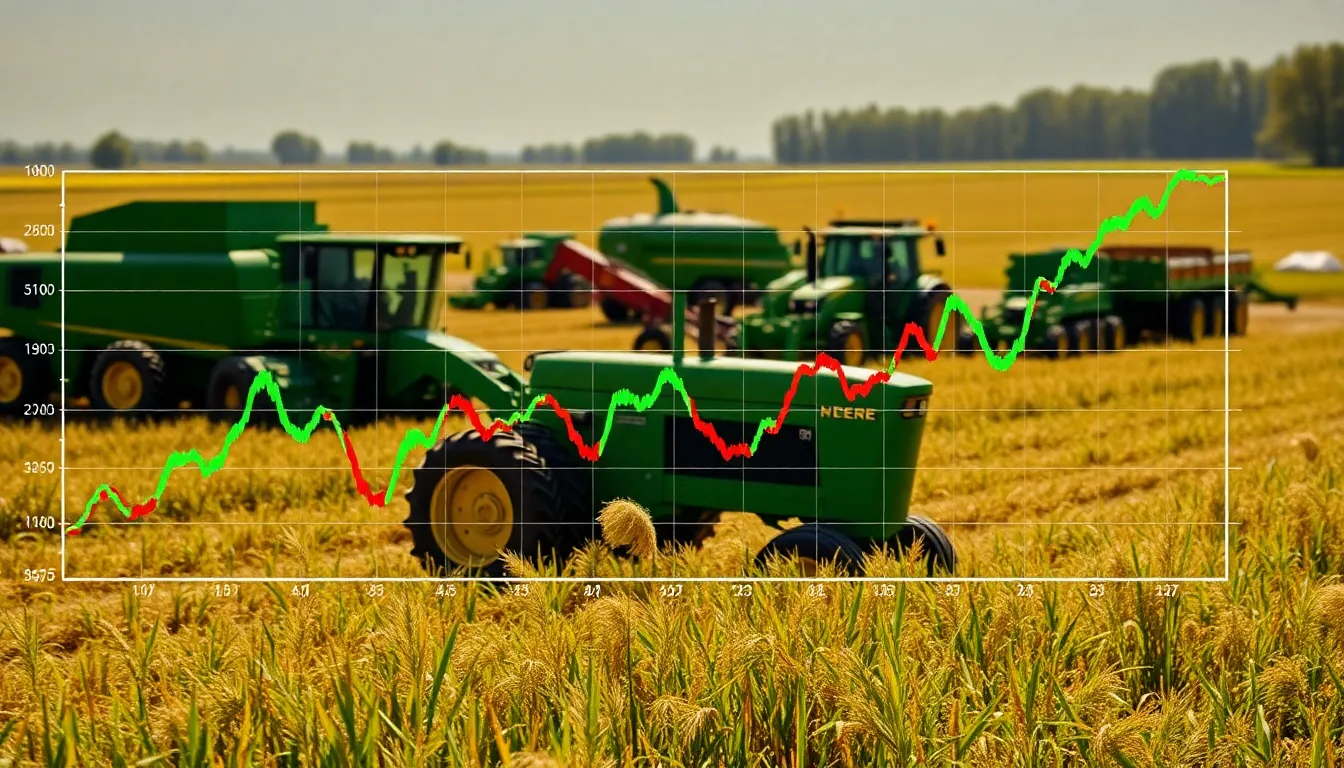In the world of agriculture and heavy machinery, John Deere stands tall, much like its iconic green and yellow tractors. Investors and farmers alike keep a keen eye on John Deere’s stock price, as it’s more than just numbers—it’s a reflection of the agricultural economy’s pulse. Today, the stock price might just have you feeling like you hit the jackpot or wondering if it’s time to plant some new seeds in your investment portfolio.
Table of Contents
ToggleOverview of John Deere Stock
John Deere’s stock price serves as a vital indicator of health within the agriculture and heavy machinery sectors. As of today, investors closely monitor its performance to gauge broader economic trends impacting farming and equipment production. The current stock price reflects market confidence in John Deere’s ability to adapt to technological advancements and changing agricultural practices.
Recent fluctuations in the stock illustrate how changes in global commodity prices directly impact farmer investments. Increased demand for John Deere machinery often correlates with rising crop prices, influencing stock performance positively. Strong sales reports enhance investor sentiment, leading to upward price movements.
A multitude of factors can sway the stock, from U.S. trade policies to weather patterns affecting crop yields. Investors should consider these elements while assessing stock volatility, as they directly link to company performance. Analysts frequently recommend monitoring earnings reports, which provide insight into growth metrics and profitability trends. Seasonal demand for agricultural products often aligns with stock fluctuations, demonstrating the cyclical nature of the farming industry.
Access to up-to-date financial news about John Deere stock offers valuable insights for potential investors. Resources for tracking stock performance include financial news platforms, market analysis reports, and brokerage tools. Engaging with these resources helps investors make informed decisions in a dynamic market environment.
Current Stock Price Analysis


John Deere’s stock price currently plays a vital role in understanding market dynamics related to agriculture and machinery. Investors often look to this figure as an indicator of economic health within these sectors.
Key Factors Affecting Stock Price
Market confidence significantly impacts John Deere’s stock valuation. Changes in global commodity prices often reflect supply and demand trends for agricultural products. U.S. trade policies can create uncertainty, swaying investor sentiment. Additionally, adverse weather patterns may disrupt crop production, influencing machinery demand. Seasonal variations also play a role, where shifts in agricultural activity align with fluctuations in stock performance. Monitoring earnings reports provides insights into growth metrics and profitability, helping investors gauge long-term potential.
Recent Price Movements
Recent fluctuations in John Deere’s stock indicate heightened market activity. For instance, prices increased following a notable rise in agricultural commodity values, signaling demand for machinery. Analysts observed a correlation between favorable earnings reports and stock price appreciation. Conversely, unexpected weather events led to temporary declines, affecting investor outlook. Those keeping track of these movements noted that market reactions often align with broader economic trends, making it essential to stay informed about related developments and financial news.
Historical Performance of John Deere Stock
John Deere’s stock performance reflects its position within the agricultural and machinery sectors, showcasing how economic trends impact investor sentiments. Long-term investors often analyze the stock’s historical trends to predict future performance.
Comparison with Industry Peers
John Deere’s stock performance can be compared against competitors like Caterpillar and CNH Industrial. Caterpillar frequently specializes in construction machinery, yet John Deere dominates the agricultural sector. Observing these companies reveals differences in their growth rates and market capitalizations. Industry trends show that John Deere often outperforms its peers in periods of high demand for agricultural equipment. Comparing year-over-year stock appreciation highlights John Deere’s resilience during market fluctuations. During recent years, it exhibited consistent growth patterns, while competitors experienced volatility due to varying sector demands. Analyzing these comparisons provides investors crucial insights into John Deere’s competitive edge in the market.
Future Outlook for John Deere Stock
Investors interested in John Deere stock should be aware of market expectations and economic influences that could shape its future performance.
Analyst Predictions
Analysts often hold diverse views on John Deere’s stock trajectory. Some predict continued growth fueled by rising demand for agricultural machinery. Recent forecasts suggest analysts anticipate John Deere’s revenue growth could reach 10% annually over the next few years. A substantial portion of this growth aligns with increasing global population demands and food requirements. Many analysts also support the notion that John Deere’s technological advancements will strengthen its market position. Insight from various financial institutions indicates a primarily bullish outlook, underscoring the company’s resilience in the face of economic shifts.
Economic Factors to Watch
Several economic variables significantly impact John Deere stock. Commodity price fluctuations frequently influence demand for agricultural equipment. As crop prices soar, farmers are more inclined to invest in new machinery. Attention should also be paid to U.S. trade policies, which directly affect export markets vital for John Deere’s growth. Global supply chain issues can disrupt production and delivery, leading to stock price volatility. Seasonal weather patterns play a crucial role as well, influencing planting and harvesting cycles that affect overall agricultural performance. Any adverse weather events may temporarily hinder sales and investor sentiment, making this an important factor for stock watchers.
John Deere’s stock price serves as a vital barometer for the agricultural sector’s health and investor confidence. As the company navigates technological advancements and fluctuating market conditions, its stock performance remains a focal point for investors. The interplay between global commodity prices and agricultural demand underscores the importance of staying informed about market trends.
With analysts projecting steady growth driven by increasing food requirements, John Deere stands poised for potential long-term gains. Investors should keep a close eye on economic factors that could influence stock movements. By understanding these dynamics, they can make informed decisions in this ever-evolving landscape.




